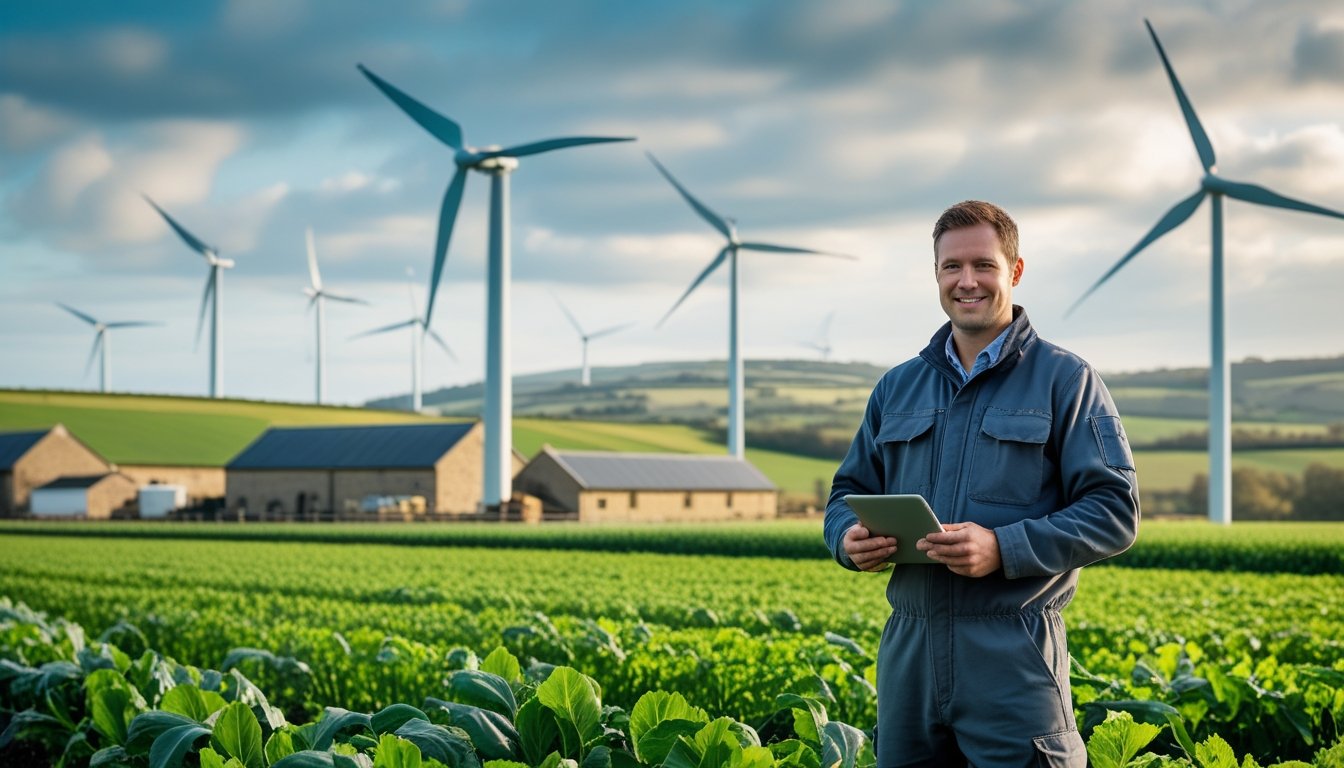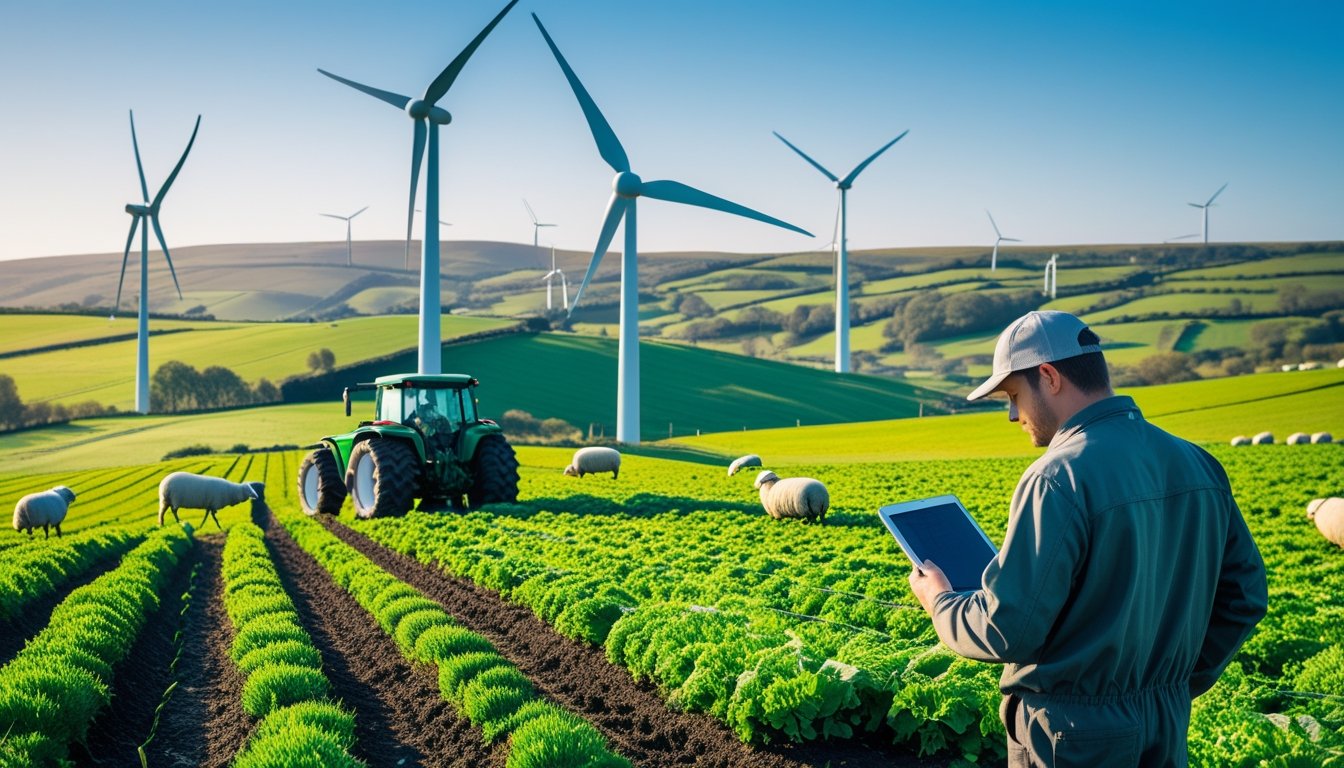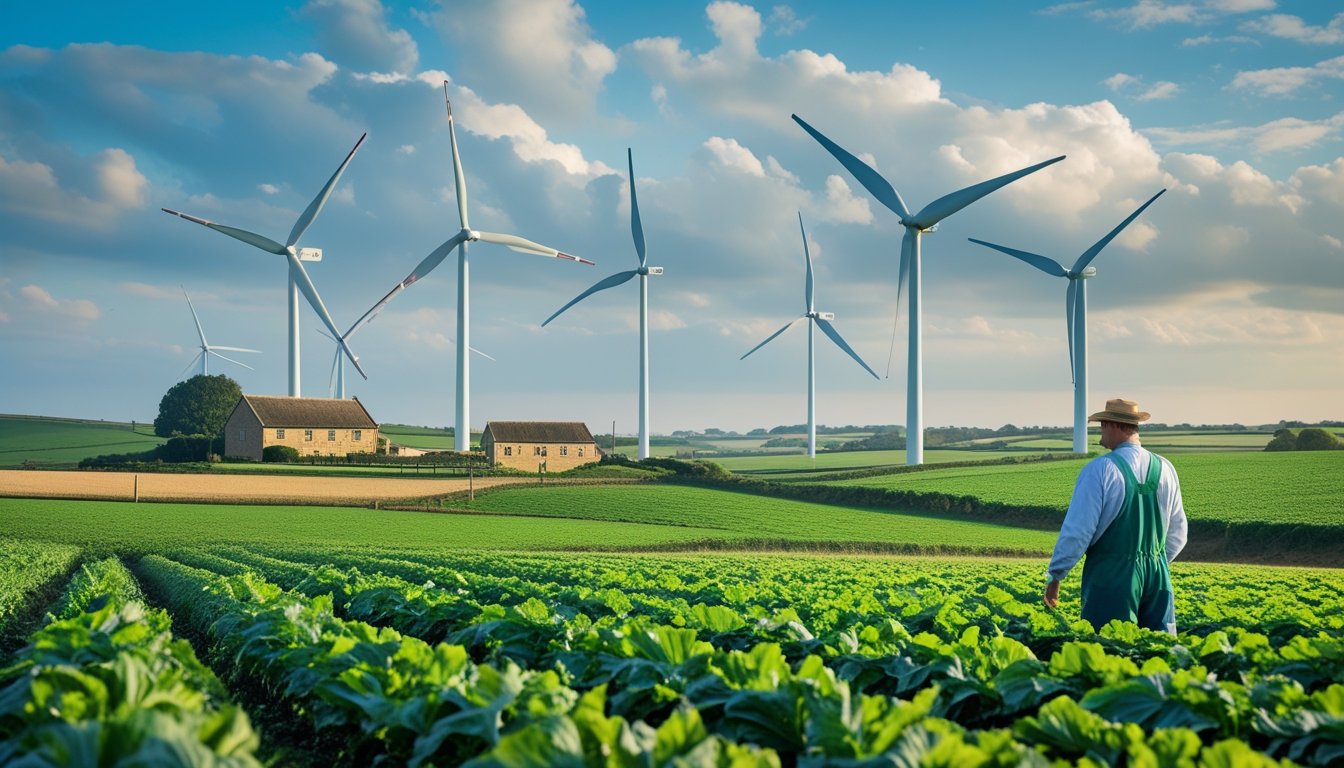Late updated: 14 Nov 2025 11:11
Written by: Oliver Bennett
Innovative Wind Energy Solutions For Rural UK Farming: Transforming The Countryside
Harnessing wind energy is proving transformative for rural farming in the UK. This sustainable energy solution is not only environmentally friendly, but it also provides farmers with cost-effective power options. As wind power becomes increasingly crucial, it underscores the ability of rural communities to enhance energy independence while reducing reliance on traditional grid sources. This transformation reshapes the agricultural landscape, providing opportunities for growth and sustainability.

Incorporating wind energy into farming practices presents new economic opportunities alongside environmental benefits. Rural areas, often blessed with consistent wind patterns, are ideal for wind turbine installations. This adaptation supports the diversification of income streams while promoting self-sufficiency, which is essential given today's high energy prices. By embracing wind technology, farms can optimise efficiency and reduce operational costs.
Community support for wind projects underscores their success, highlighting a shared vision of innovation and resilience. Farmers and local stakeholders working together can leverage these projects to achieve remarkable outcomes in energy production. The shift towards wind energy reflects a broader movement in the UK towards sustainable solutions, crucial for the future of rural farming.
Key Takeaways
- Wind power is vital for sustainable and cost-effective energy in rural UK.
- Utilising wind energy in farming promotes economic diversification.
- Comprehensive community involvement propels wind energy projects.
Innovative Wind Energy Solutions Transforming Rural UK Farming
In rural UK farming, adopting innovative wind energy solutions enhances both economic resilience and environmental sustainability. These advancements in renewable energy provide numerous benefits to farmers, like reducing their carbon footprint and boosting energy independence. The following sections explore key elements impacting rural farming, such as integration of onshore projects, advancements in turbine technology, and economic and regulatory considerations.
Onshore Wind Projects Integration
Onshore wind projects offer significant opportunities for rural UK farming by supplying clean energy while leveraging existing agricultural landscapes. The recent lifting of the onshore wind ban has opened up agricultural land for wind energy development, potentially impacting up to 17.5 million hectares. Farmers can utilise this land to host wind turbines, turning otherwise under-used areas into productive energy resources.
Farmers, as key stakeholders, benefit from the dual use of land for farming and energy generation. This not only promotes a low-carbon economy but also supports energy security. Successfully integrating onshore wind projects requires strategic planning to ensure grid connectivity and minimise landscape disruption. Engaging local communities in these projects can further enhance acceptance and cooperation, ensuring sustainable development.
Advancements in Wind Turbine Technology
Recent advancements in wind turbine technology have made them more efficient and adaptable for rural environments. Modern turbines now incorporate advanced materials and design improvements, increasing their lifespan and energy output. Enhanced blades and improved aerodynamics help in capturing more wind, making turbines viable even in areas with lower wind speeds.
Innovation is also seen in the form of smaller, modular designs that are optimised for smaller-scale, community-based projects. These advances allow farmers to install turbines that are well-suited to their specific conditions, enhancing overall energy efficiency. The economic viability of these technologically advanced turbines aids in promoting sustainable agriculture practices.
Economic and Environmental Benefits for Farmers
Implementing wind energy solutions has direct economic and environmental benefits for farmers. By generating renewable energy, farmers can reduce their operational costs, leading to improved profitability. Additionally, wind projects can create jobs in construction, maintenance, and operations, supporting local economies and reducing unemployment in rural areas.
Environmentally, wind energy significantly cuts greenhouse gas emissions, helping mitigate climate change. It supports sustainable agricultural practices by decreasing reliance on fossil fuels and reducing the carbon footprint of farming operations. Moreover, wind turbines, when effectively integrated into farming landscapes, can maintain ecological balance without damaging biodiversity.
Key Planning and Regulatory Considerations
Planning and regulatory frameworks play a crucial role in the successful deployment of wind energy projects on farms. While opportunities have increased with the lifting of certain restrictions, the planning system remains complex. Navigating through the intricate regulatory landscape requires careful consideration of land use, grid connections, and environmental impact assessments.
Farmers must also be aware of potential conflicts with local planning authorities and ensure that their projects adhere to guidelines established for rural landscapes. Collaborating with regulatory bodies and engaging in community consultations can facilitate smoother approval processes. Understanding key regulations and planning requirements ensures efficient project execution while preserving rural settings.
Diversification and Emerging Opportunities in Rural Clean Energy

Diversification in rural clean energy presents vast potential for enhancing sustainability. Integrating renewable sources such as wind, solar, and bioenergy can drive economic progress. Additionally, financial incentives and community engagement are vital to their success.
Hybrid Renewable Projects: Wind, Solar, and Bioenergy
Combining wind, solar, and bioenergy resources creates robust renewable energy solutions. By integrating these sources, rural farms can harness the benefits of each. Solar panels complement wind turbines by generating power during sunny and calm periods. Bioenergy from agricultural waste further increases energy productivity.
This hybrid approach ensures continuity, addresses fluctuating energy demands, and encourages sustainable land management. It enables farms to utilise available resources efficiently, promoting clean power production. Such projects offer avenues for economic growth through cost savings and new revenue streams from surplus energy sales.
Financial Incentives and Community Engagement
Financial incentives play a crucial role in encouraging renewable energy investments. Government grants, subsidies, and tax reliefs make these projects attractive. Solar farms and other renewable installations become feasible for more farmers. These incentives ease initial costs, allowing for broader adoption of clean technologies.
Active community engagement is also essential. Educating and involving local communities bolsters support and paves the way for successful implementation. Engaged communities contribute to project adaptability and acceptance. Collaboration ensures the energy transition aligns with local needs and preferences, maximising benefit for all stakeholders.
Maintenance, Scalability, and Energy Storage Solutions
Ensuring reliable operation requires focus on maintenance and scalability. Regular upkeep of wind and solar installations is vital to achieve maximum efficiency and longevity. Building expertise in this area is beneficial for local job creation and skills development.
Advanced smart grids and energy storage solutions are integral to handling energy supply and demand fluctuations. These technologies enable efficient energy distribution and storage, enhancing grid stability. Prioritising scalability allows projects to grow alongside increasing energy demands, proving crucial for long-term success in rural renewable energy initiatives.
Frequently Asked Questions

In exploring innovative wind energy solutions for rural UK farming, several key factors must be considered. These include cost-effectiveness, impact on energy self-sufficiency, regulatory requirements, contribution to sustainability goals, maintenance needs, and potential challenges.
What are the cost-effective wind energy systems suitable for rural UK farms?
For many rural UK farms, cost-effective solutions often involve small to medium-sized wind turbines. These systems harness consistent wind resources and provide a significant return on investment over time. Factors such as initial setup costs, long-term savings on energy bills, and available government incentives play a crucial role in determining cost-effectiveness.
How can small-scale wind turbines impact energy self-sufficiency in UK agriculture?
Small-scale wind turbines can dramatically increase energy self-sufficiency for UK farms. By producing their own power, farmers reduce reliance on external electricity sources and lower energy costs. This shift not only enhances energy independence but also aligns with the growing demand for sustainable farming practices that reduce carbon footprints.
What planning permission requirements must be considered before installing wind turbines on UK farmland?
Planning permissions for wind turbines on UK farmland involve several considerations. We need to evaluate factors such as turbine height, proximity to residential areas, and environmental impact assessments. Engaging with local planning authorities early in the process ensures compliance with regulations and helps address any community concerns.
How does wind energy contribute to the sustainability goals of UK farms?
Wind energy significantly advances sustainability goals by offering a renewable energy source that reduces carbon emissions. By incorporating wind power, farms move towards cleaner energy solutions while retaining the natural aesthetics of rural landscapes. This integration supports broader environmental objectives and enhances farm resilience against energy market fluctuations.
What are the maintenance needs for wind turbines on rural UK properties?
Wind turbines require routine maintenance to ensure optimal performance and longevity. Maintenance tasks include regular inspections of mechanical components, blade cleaning, and monitoring of electrical systems. Engaging with professional service providers for scheduled maintenance can prevent unexpected downtime and extend the lifespan of the turbines.
What are the common challenges associated with adopting wind energy solutions in the UK countryside?
Adopting wind energy solutions involves overcoming challenges such as community opposition and variable wind conditions. Concerns about noise, visual impact, and effects on local wildlife can lead to resistance. Addressing these issues through community engagement and environmental assessments is essential to facilitate successful implementation of wind projects.
